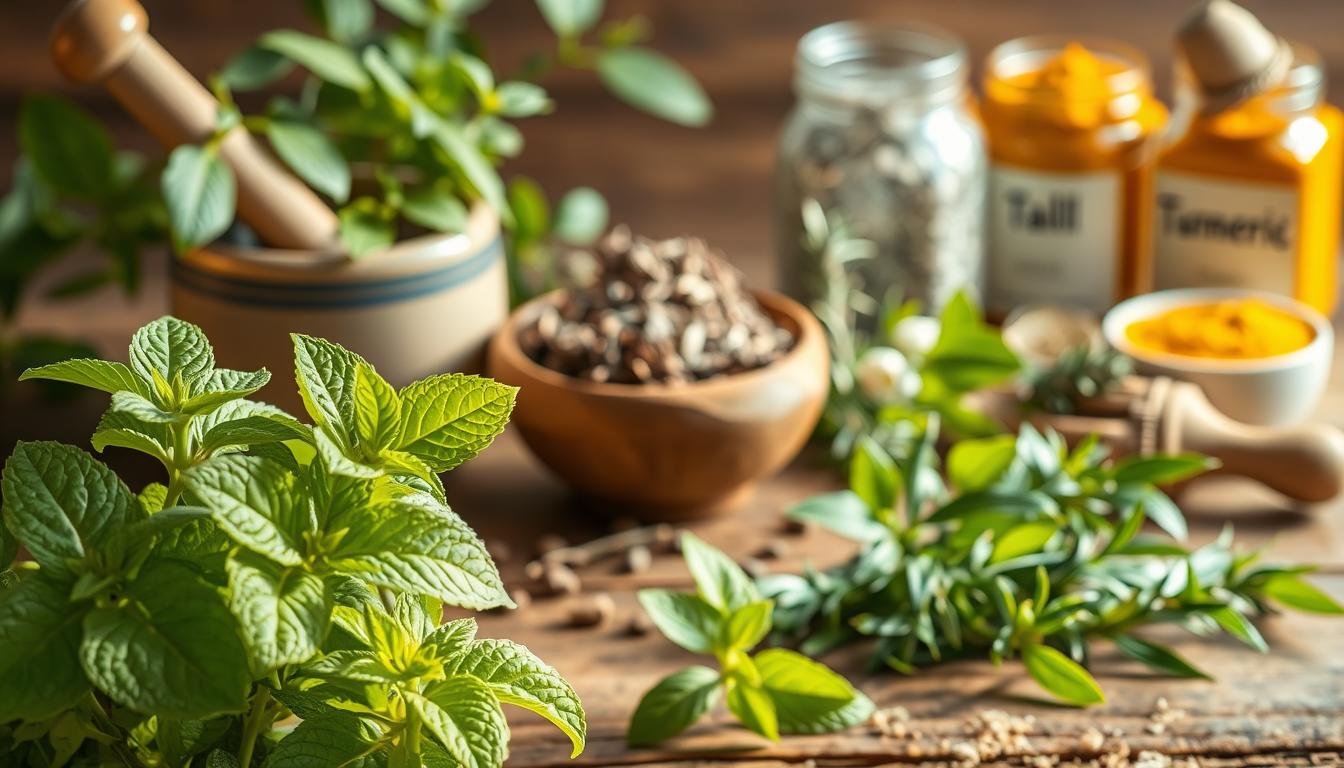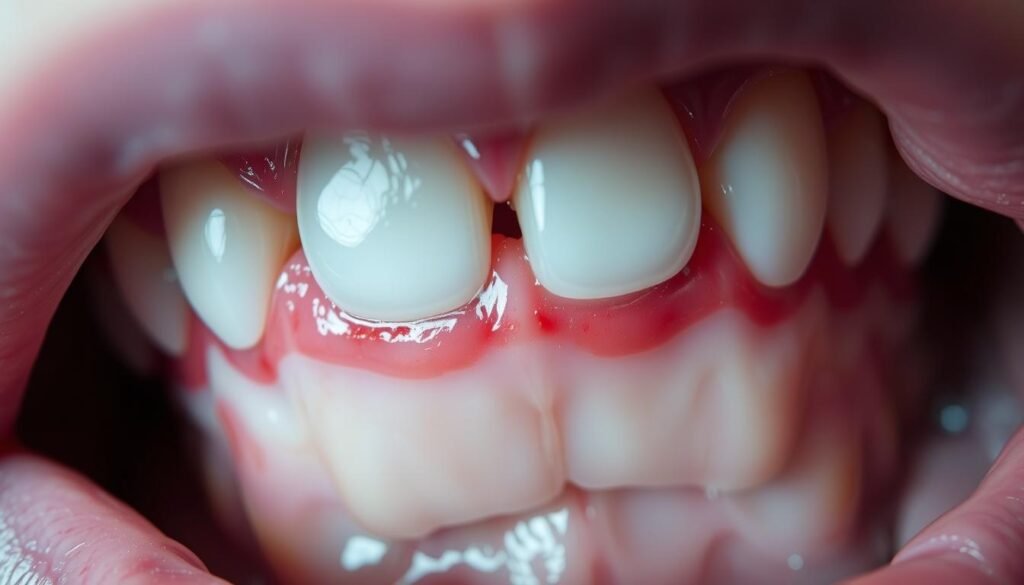Physical Address
304 North Cardinal St.
Dorchester Center, MA 02124
Physical Address
304 North Cardinal St.
Dorchester Center, MA 02124

Are you tired of painful, swollen gums that make eating and smiling hard? What if nature has the answer to your oral health problems without harsh chemicals?
Gum inflammation is more than a minor issue. It can signal serious oral health problems that need your attention. This guide will show you natural remedies to fight gum inflammation and improve your dental health.
Whether you have mild sensitivity or serious gum issues, natural solutions can change how you care for your mouth. You’ll learn about herbal treatments and diet changes to help your gums and prevent inflammation.

Gum inflammation is a serious issue that can get worse if ignored. Keeping your teeth clean is key to avoiding it. Bacteria along your gum line form plaque, leading to inflammation and possibly periodontal disease.
Gingivitis is the first sign of gum inflammation. It makes your gums red, swollen, and bleed when brushing. If not treated, it can turn into a more serious periodontal disease, harming your gums and bones.
Poor dental care is the main cause of gum inflammation. Not brushing and flossing enough lets bacteria grow, causing infections. Regular dental visits, good cleaning habits, and a consistent oral care routine can stop these problems.
Smoking, genetics, hormonal changes, some medications, and health issues like diabetes increase your risk. Knowing these risks helps you protect your mouth and avoid serious diseases.
Looking into natural ways to keep your gums healthy can change how you take care of your teeth. Essential oils have strong healing powers that help with tooth care and lessen inflammation. Tea tree, peppermint, and clove oils are top picks for keeping your mouth healthy.
Peppermint oil gives a cool feeling and fights off bacteria that harm your gums. Its antibacterial properties keep your mouth safe from bad germs. Clove oil has eugenol, which numbs and heals, making it great for sore gums.
When using essential oils for your teeth, it’s important to dilute them. Mix a few drops with a carrier oil like coconut oil to avoid irritation. You can make a mouth rinse or add it to your toothbrushing routine. Always talk to a dentist before trying new treatments.
Tea tree oil is also a strong ally against gum swelling. Its natural antiseptic properties help reduce swelling and fight off bacteria. Use these oils carefully and with advice to get the most health benefits for your mouth.
Quick recommendation: Our blog is filled with useful tips to help you succeed. To enhance your oral health, take a look at Prodentim
Salt water rinses are a simple yet powerful tool for your mouth. They can quickly soothe and heal inflamed gums. By mixing warm water with salt, you create a solution that fights bacteria and reduces swelling.
To make the perfect rinse, mix half a teaspoon of salt with a cup of warm water. Swish it around your mouth for 30 seconds, then spit it out. This helps remove harmful bacteria and promotes healing in your gums. Dentists often suggest this as a way to keep your mouth healthy.
You can rinse with salt water up to two or three times a day, if your gums are sensitive or after dental work. Salt’s natural antiseptic properties help reduce inflammation and prevent bacteria growth. Your gums will appreciate this easy yet effective care.
Even though salt water rinses are helpful, they shouldn’t replace brushing and flossing. Think of them as an extra tool to help keep your gums healthy and prevent dental problems.
Exploring natural ways to keep your teeth and gums healthy is a big step. Herbal teas are a great choice for fighting tooth decay and boosting gum health. Some teas are known for their amazing healing powers.
Chamomile tea is great for reducing gum inflammation. It has compounds that calm down irritated tissues and help them heal. Green tea is also a good choice, thanks to its antioxidants that battle harmful bacteria causing tooth decay.
Sage tea is known for its strong antimicrobial properties. It helps protect your mouth from infections. To make herbal tea rinses, use warm water and let the herbs steep for 5-7 minutes. Then, gently swish the tea around your mouth for the best results.
Learning about dental care isn’t just about brushing and flossing. Adding herbal teas to your routine can add extra protection against dental problems. Always talk to your dentist to see how these natural remedies fit with your current oral care.
Even though herbal teas are very beneficial, they shouldn’t replace dental visits. Regular check-ups and good oral hygiene are key to preventing tooth decay and keeping your teeth healthy for a long time.
Keeping your mouth healthy needs a daily routine. Your dental care is key to avoiding gum problems and keeping your mouth healthy. Choose a toothbrush with soft bristles to clean your teeth well without harming your gums.
Brushing right is important for your mouth’s health. Dentists say to brush for two minutes, using gentle circular motions. Make sure to cover all your teeth. Electric toothbrushes clean better, removing plaque more than manual ones. Change your toothbrush or brush head every three to four months for best results.
Flossing is also very important but often forgotten. It removes food and plaque from between your teeth, where your toothbrush can’t. Use interdental brushes or water flossers if regular floss is hard. Add an antiseptic mouthwash to kill bacteria and freshen your breath.
Seeing your dentist regularly is essential for your mouth’s health. They can spot problems early and clean your teeth better than you can at home. Most dentists suggest visiting every six months to keep your teeth and gums healthy.
Keeping your gums healthy is more than just brushing your teeth. Certain vitamins and minerals are key to protecting your mouth. Vitamin C is a standout because it strengthens gum tissue and boosts collagen production, fighting gum inflammation.
Vitamin D is also vital for gum health. It helps your body use calcium, making teeth stronger and lowering gum disease risk. People with low vitamin D often face more gum issues and weaker oral defenses.
Coenzyme Q10 is a top choice for tooth care. It fights inflammation and aids in gum tissue repair. Studies show it can slow gum disease and aid in healing.
Before starting supplements, talk to a healthcare expert. They can guide you on the right amount and how it fits with your dental care. A mix of good nutrition and oral hygiene is your best defense against gum problems.
Quick recommendation: Our blog is filled with useful tips to help you succeed. To enhance your oral health, take a look at Prodentim
Ayurvedic medicine has natural solutions for gum health and inflammation. These dental treatments have been around for thousands of years. They offer effective ways to keep your mouth healthy, alongside modern care.
Oil pulling is a standout Ayurvedic practice for oral hygiene. Swish coconut or sesame oil in your mouth for 10-15 minutes. It helps reduce harmful bacteria and supports gum health.
Neem and turmeric are key in Ayurvedic dental care. Neem leaves and twigs fight oral infections with their antibacterial properties. Turmeric’s anti-inflammatory compounds soothe irritated gums and reduce swelling. Use them as mouthwashes, tooth powders, or in gargles.
Start slow and be consistent with these preventive dentistry practices. Talk to your dentist to make sure they fit your oral health needs. Ayurvedic methods are a gentle, natural way to boost your gum health and overall wellness.
Your diet is key in fighting tooth decay and managing gum disease. The foods you eat can either help or hurt your gums. Foods high in sugar and acid feed bacteria, raising your risk of gum inflammation.
Nutrients are great for keeping your mouth healthy. Omega-3s in fish like salmon fight inflammation and help gums heal. Foods rich in vitamin C, like citrus fruits and broccoli, boost your gums’ defense against disease.
Antioxidant foods like berries and green tea fight off bad bacteria and reduce inflammation. Drinking water helps clean your mouth and keeps saliva flowing, which protects your teeth.
Adding probiotics from yogurt and fermented foods supports a healthy mouth. Try to cut down on processed sugars and carbs that harm your gums.
Stress can harm your oral health in unexpected ways. It weakens your immune system, making your gums more prone to inflammation and infections. When stressed, you often neglect your oral hygiene, leading to dental problems.
Dental education shows that stress leads to bad habits like teeth grinding and clenching. These actions put too much pressure on your gums and teeth, raising the risk of gum disease. Stress also makes it harder for your body to fight off bacteria, speeding up gum damage.
It’s important to manage stress to keep your gums healthy. Simple steps like deep breathing, exercise, and meditation can help lower stress. Keeping up with good oral hygiene can also fight off stress’s negative effects on your teeth.
Mindfulness and managing stress are vital in dental education. Knowing how your emotional state affects your mouth health helps you take a holistic approach. This can reduce the risk of gum problems.
Your mental health is linked to your oral health. By reducing stress and sticking to good oral care, you can protect your gums and overall health.
When home care isn’t enough, professional dental treatments are key for gum health. Your dentist offers specialized care that goes beyond what you can do at home. Treatments like scaling and root planing remove plaque and tartar that harm gums.
Dentists perform thorough exams to find and fix problems. They use advanced tools to check your gums and plan your treatment. Depending on your case, they might suggest antibiotics or laser therapy.
Using both natural remedies and professional treatments is the best way to keep your gums healthy. Your dentist will help you mix home care with clinical treatments. Regular dental visits are important to catch problems early and prevent worse gum issues.
Talking openly with your dentist about your gum health is important. Share the natural remedies you use and ask about their recommended treatments. Working together, you get the best care for your oral health.
Prevention is always better than treatment. Getting professional dental care and keeping up with oral hygiene can prevent serious gum problems later.
Good oral health is more than just brushing and flossing. We’ve looked at natural ways to keep your gums healthy. These include essential oils and changing your diet.
Your gum health is very important for your overall health. The natural methods we talked about can help a lot when used with dental care. Remember, doing these things every day can really help prevent gum problems.
Don’t forget to see your dentist regularly. Natural remedies are great, but they’re even better with dental care. If your gums hurt or look different, see a dentist right away.
By focusing on gum health, you can improve your overall health. Use natural methods, keep up with good oral hygiene, and see your dentist often. This will help you have healthy gums and a beautiful smile.
Quick recommendation: Our blog is filled with useful tips to help you succeed. To enhance your oral health, take a look at Prodentim